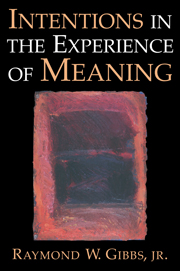Book contents
- Frontmatter
- Contents
- Acknowledgments
- Part I INTRODUCTION
- Part II SEARCHING FOR INTENTIONS
- Part III INTENTIONS IN DISCOURSE
- Part IV INTENTIONS IN CRITICISM
- Chapter 8 QUESTIONS OF AUTHORSHIP
- Chapter 9 LITERARY INTERPRETATION AND CRITICISM
- Chapter 10 INTERPRETING THE LAW
- Chapter 11 UNDERSTANDING ART
- Part V CONCLUSION
- Notes
- Name Index
- Subject Index
Chapter 9 - LITERARY INTERPRETATION AND CRITICISM
Published online by Cambridge University Press: 05 June 2012
- Frontmatter
- Contents
- Acknowledgments
- Part I INTRODUCTION
- Part II SEARCHING FOR INTENTIONS
- Part III INTENTIONS IN DISCOURSE
- Part IV INTENTIONS IN CRITICISM
- Chapter 8 QUESTIONS OF AUTHORSHIP
- Chapter 9 LITERARY INTERPRETATION AND CRITICISM
- Chapter 10 INTERPRETING THE LAW
- Chapter 11 UNDERSTANDING ART
- Part V CONCLUSION
- Notes
- Name Index
- Subject Index
Summary
What must it be like to write a novel, poem, or play that people don't seem to understand? Several famous novelists have experienced bewilderment over how their works have been misinterpreted, or over interpreted, and their communicative intentions distorted or completely ignored. In the introduction to the 1973 edition of her classic novel The Golden Notebook, Doris Lessing reflects on her own situation:
Ten years after I wrote it, I can get, in one week, three letters about it, from three intelligent, well-informed people, who have taken the trouble to sit down and write to me. One might be in Johannesburg, one in San Francisco, one in Budapest. And here I sit in London, reading them at the same time, or one after another – as always grateful to the writers, and delighted that what I've written can stimulate, illuminate – or even annoy. But one letter is entirely about the sex war, about man's inhumanity to woman, and woman's inhumanity to man, and the writer has produced pages and pages all about nothing else, for she – but not always a she – can't see anything else from the book.
The second is about politics, probably from an old Red like myself, and he or she writes many pages about politics, and never mentions any other theme.
These two letters used, when the book was as it were young, to be the most common.
[…]
- Type
- Chapter
- Information
- Intentions in the Experience of Meaning , pp. 234 - 272Publisher: Cambridge University PressPrint publication year: 1999



